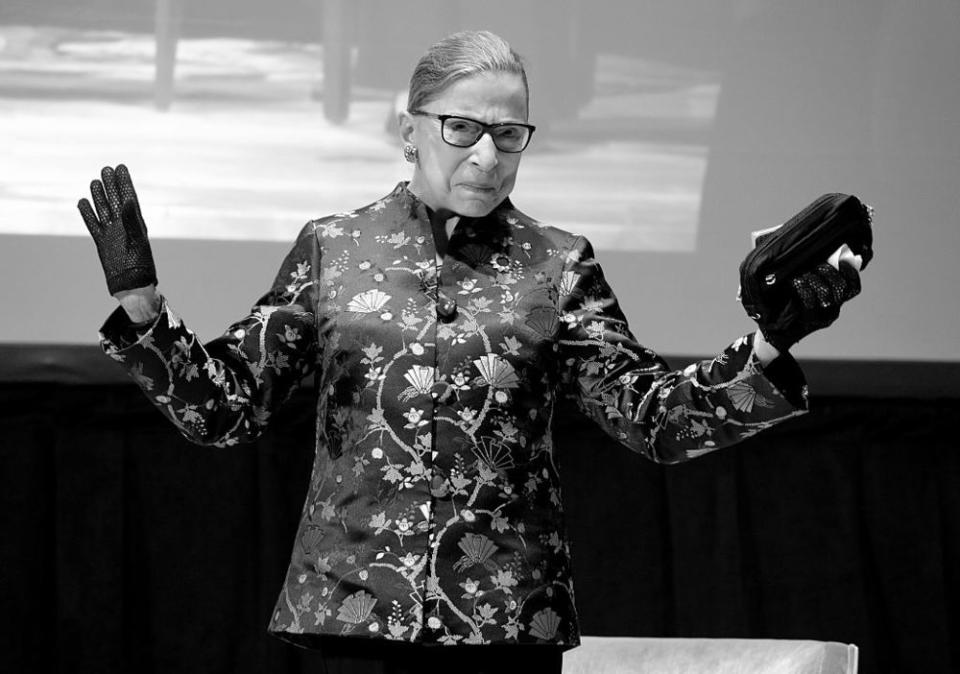Ruth Bader Ginsburg's tenacity helps me understand my late grandmother's courage
March 15th is Ruth Bader Ginsburg’s birthday. To celebrate the Supreme Court Justice and feminist icon, HG contributor Alli Hoff Kosik reflects on how RBG’s trailblazing path reminds her of her late grandmother.
If you’ve seen the movie On the Basis of Sex, then you probably already know which scene prompted me to break down in tears. It wasn’t the scene when Armie Hammer, in the role of Ruth’s husband, Marty Ginsburg, is diagnosed with cancer at an age that feels inexplicably young. It wasn’t the scene in which the triumphant Ruth Bader Ginsburg herself delivers the brilliant legal argument that started turning the tides on sex discrimination (in spite of all the sex discrimination she encountered along the way).
It was the scene when RBG marches gracefully and intently marches up the steps of the Supreme Court. She’s not wearing her black legal robes or her lacy collar., but something about her manner, that graceful intention, reminded me so much of grandmother. I sat in my movie theater seat and cried. My best friend put her hand on my shoulder.
We lost my grandmother Eleanor Patricia Cummins—for the purposes of this essay, can I call her EPC?—on September 20th, 2018, which also happened to be my birthday. I know many people can say they shared a “special relationship” with a grandparent, and I echo that for my Nana. For seven of my childhood and teen years, she lived with me and my mom. Nana did a lot of the things that moms do. She drove me to cheerleading practice and sat in the bleachers during games. She read my stories in the school newspaper. She critiqued said school newspaper in great detail when I eventually became editor in chief. Sometimes she commented that I should maybe gain or lose weight. She took me to Europe to celebrate my high school graduation and bought me my wedding dress when I got married in 2016.
I’m not going to go into the specifics of EPC’s death because, honestly, it’s all too upsetting, but suffice it to say that it was sudden. One day she was here—calling me at literally 7 a.m. to ask me about my new puppy—and the next she wasn’t. A few weeks after that terrible day, I was helping my mom clean out Nana’s house and I found a box of letters that she’d received from my grandfather in the ’50s; he was a law student and she was an undergrad. If we’re being honest, their marriage didn’t end up being so great and eventually ended—but the romance within these letters wasn’t really the point for me (though they are kind of romantic).
I’d always known that EPC was brilliant and accomplished. I knew that she had fought against male-enforced boundaries for most of her life in order to achieve the professional life in education that she wanted. But reading the letters reintroduced me to her journey from an earlier entry point, reminding me of all that she’d done and all that she’d conquered. They helped me grieve for her, and eased the pain of such a sudden loss.
After watching On the Basis of Sex, my Nana’s life story has become even clearer to me. I saw the parallels between two extraordinary women of the same generation.

These women had to find ways to break out of the limitations imposed on them by men.
My Nana’s father told her that she couldn’t go to college—despite the fact that she was at the top of her class and her family had the financial means for her to go. She understood that her brother would be allowed, but that she would have to fight for it. Nana recalled sitting at the foot of the stairs in her childhood home, crying and yelling for her right to get an education, too.
Ultimately, my grandmother got there—just like RBG got to Harvard Law School, and then to a professorship at Rutgers, and then to courtrooms where she would speak on sex discrimination cases. In the end, she would, of course, become the Supreme Court justice we all know and love. My grandmother became a Spanish teacher (at an all boy’s Catholic high school—she was Jewish!) and a respected school administrator who was loved—and, yes, sometimes feared—by her students.
These women were both born brilliant and curious. I’ve always said that my Nana was the smartest person I’ve ever known. Even in her retirement, she successfully completed the New York Times crossword puzzle every single week. She is still the only person who could ever truly engage in a conversation with my husband about his work—a highly technical job at a bank that I still don’t fully understand, even after six years. And I don’t need to explain to you how smart RBG is. I would have loved to have seen them go toe-to-toe in an intellectual conversation. Two wise and well-read women with so much to say about the world.
These women were put in positions—like so many other women before and after them—to choose between work and family. While this tightrope act is common Instagram caption fodder today, it was straight-up pioneering in the ’60s and ’70s. When RBG and her daughter argued relentlessly in On the Basis of Sex, it reminded me of stories my mom has shared about growing up with my Nana as her mother. When women of their generation opted to lead with their smart, ambitious, busy selves, they ran the risk of looking more than just overwhelmed. They ran the risk of looking mean or dismissive or negligent. And the result of the tension that society placed upon them was probably not so easy to deal with at home.

These women were complicated, even at times difficult. My mom likes to joke that EPC was “a force of nature.” I imagine that RBG’s family would say the same about her, since I can pretty much deduce that it’s an apt description based on what I’ve seen of the Supreme Court Justice in the media. For both of them, being headstrong and driven was surely key to success in work and academia—but perhaps a complicating factor in some personal relationships.
RBG and EPC also share a love of culture, the arts, reading, and exercise. I never witnessed my Nana work free weights quite like RBG in those beloved training videos, but she took long walks every day, quite literally jogged her way around the house every morning, and hiked in foreign countries a few times each year, up until just a few months before she died.
Like the legacy that Ruth Bader Ginsburg leaves on women everywhere, my grandmother has left my family with a legacy of intelligence, focus, confidence, and grace—even when things aren’t going so well.
Both women inspire me to embrace my femininity and my power, to be giving and tough. As we celebrate RBG’s birthday, and as I reflect on my Nana’s life and mourn her loss, I’m grateful for their ferocity in the battles they fought so that I wouldn’t have to.


